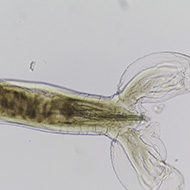"These data put us in a much stronger position to understand resistance in helminths" - Dr Stephen Doyle, a first author of the study.
Genetic basis identified for drug resistance in parasitic worms.
A team of researchers has mapped the genes linked to drug resistance of the parasitic worm, Haemonchus contortus.
The drug resistance poses a great threat to the global effort to limit the parasitic worm's impact on humans, companion animals and livestock, and this research creates a foundation for understanding how this drug resistance arises, and how it could be controlled.
Carried out by researchers at the Wellcome Sanger Institute, the University of Glasgow and the Moredun Research Institute, the study identifies new and known genetic variants for three of the most important drugs used for parasitic worm control.
Researchers used genetic crosses, drug selection and whole genome sequencing to map the genes linked to drug resistance of the helminth.
Dr Roz Laing, a first author of the paper, explained: “Helminth infections place a huge economic and health burden on people throughout the world. In people and animals, treatment relies on a small number of anthelmintic drugs, all of which were initially developed for veterinary use.
“Alarmingly, we now see widespread resistance to these drugs in livestock and pets, highlighting a need for more strategic use and earlier detection of resistance to maintain drug efficacy.
“Identifying the genes involved in resistance to three different drugs in an economically important species like Haemonchus contortus is an important step forward.”
The researchers have suggested that the results are promising, with so few genes involved in drug resistance, this allows for new tools to be developed quickly.
'Genomic landscape of drug response reveals mediators of anthelmintic resistance' has been published in Cell Reports.







 Birmingham Dogs Home has issued an urgent winter appeal as it faces more challenges over the Christmas period.
Birmingham Dogs Home has issued an urgent winter appeal as it faces more challenges over the Christmas period.
